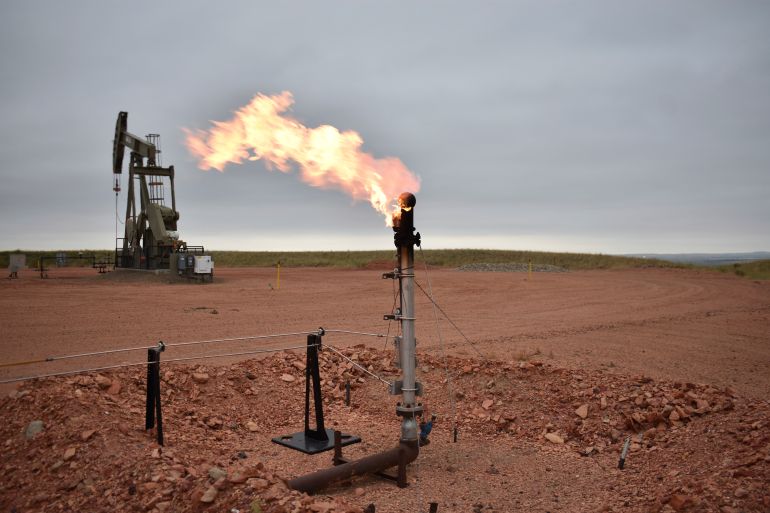editor’s note: This site normally confines itself to items specially about the Middle East and the Eastern and Southern Mediterranean. The item below, while on climate change generally, is included here because of the importance of fossil fuel extraction in the region – State owned and private corporations that are active, and the continuing development of new fossil fuel extraction in the region by governments and corporate entities. S.S.
Christiana FigueresClimate negotiator, author, co-founder of Global Optimism, co-host of the climate podcast Outrage + Optimism. 6 Jul 2023
Their unprecedented profits over the past year have shown their unwillingness to adapt. It’s now D-Day for them.

More than most members of the climate community, I have for years held space for the oil and gas industry to finally wake up and stand up to its critical responsibility in history.
I have done so because I was convinced the global economy could not be decarbonised without their constructive participation and I was therefore willing to support the transformation of their business model.
But what the industry is doing with its unprecedented profits over the past 12 months has changed my mind.
Let’s remember what the industry could and should be doing with those trillions of dollars: stepping away from any new oil and gas exploration, investing heavily into renewable energies and accelerating carbon capture and storage technologies to clean up existing fossil fuel use. Also, cutting methane emissions from the entire production line, abating emissions along their value chain and facilitating access to renewable energy for those still without electricity who number in their millions.
Instead, what we see is international oil companies cutting back, slowing down or, at best, painfully maintaining their decarbonisation commitments, paying higher dividends to shareholders, buying back more shares and – in some countries – lobbying governments to reverse clean energy policies while paying lip service to change.
On top of that, the industry as a whole is making plans to explore new sources of polluting fossil fuels and, in the United States, intimidating stakeholders who have been moving towards environmental, social and governance responsibility.
Of course, there are some exceptions to these sweeping generalisations, but the trend is clear. What are the leaders of the fossil industry thinking? As we evolve the global economy, we have one way forward: decarbonise quickly enough to avert the worst of climate impacts, especially the impacts upon the most vulnerable.
When asked about their irresponsible decisions, executives often cite some version of the prisoner’s dilemma, showing unwillingness to step out of the pack and lead the way forward in fear of diminishing their gains vis a vis their peers. They occasionally also cite their own version of climate justice, which is that less fossil fuel energy produced would mean more expensive energy, including for the poorest.
What they seem to have forgotten is that we are way beyond strategy games. Let’s get real. We have reached the point where decarbonisation will happen with the fossil fuel industry or without them.
As a recent Rocky Mountain Institute report points out, renewables are simply a superior technology.
“The energy transition is a shift from a concentrated, expensive, polluting commodity-based system with no learning curve, to an efficient, manufactured, technology-driven system that offers continuously falling costs and is available everywhere,” the report argues. “It is moving from heavy, fiery molecules to light, obedient electrons; from hunting fossil fuels to farming the sun.”
According to the International Energy Agency (IEA), the world will add a record 440GW of new renewable capacity this year. That is more than double what we added in 2019, double what the IEA predicted in 2020, and 24 percent more than the IEA foresaw just six months ago.
Exponential growth of renewables is the new reality. Today, for every $1 invested in fossil fuels, $1.7 is going to clean energy. This year, the world will invest more than $1.7 trillion into clean energy.
Despite growth in energy generation worldwide, greenhouse gas emissions from the power sector will fall for the first time this year. That is in part due to demand for fossil fuel energy already having peaked, and renewables eating into the energy market share. This year, for the first time, solar will attract more capital than oil production.
At the same time, consumers are benefitting from enormous savings. In the European Union alone, newly installed wind and solar saved consumers 100 billion euros ($108bn) between 2021 and 2023, and it has helped keep the price of wholesale electricity prices down.
The fossil fuel industry is facing decline, no matter what. It is D-Day for them.
The powerful state-owned companies as well as international firms have to decide whether they transition to the energies of the 21st century and thereby accelerate the exponential curve of the energy transition, or if their flame dies out while they remain blind and in pernicious resistance.
Do they want to gain some public license (if any is left for them) by speeding the winds of change or do they want to be the last men standing? If they choose the latter, the transition to clean energies will occur despite them, but it will likely be too late for humanity. The fossil fuel industry will have powered human development in the 20th century and then destroyed it in the 21st.
Their moment to decide is now.
The views expressed in this article are the author’s own and do not necessarily reflect Al Jazeera’s editorial stance.
- Christiana FigueresClimate negotiator, author, co-founder of Global Optimism, co-host of the climate podcast Outrage + Optimism.Christiana Figueres is co-founder of Global Optimism, co-host of the climate podcast Outrage + Optimism and co-author of The Future We Choose. She is Chair of the Earthshot Prize and was head of the UNFCCC between 2009-2016, where she helped negotiate the Paris Agreement on climate change.
https://www.aljazeera.com/opinions/2023/7/6/i-thought-fossil-fuel-firms-could-change-i-was-wrong
